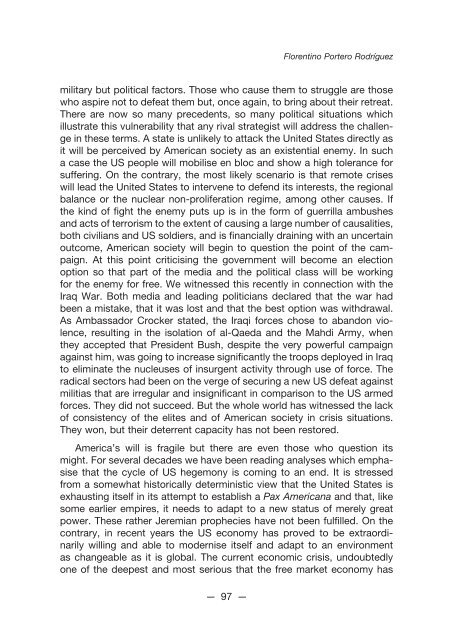Strategic Panorama 2009 - 2010 - IEEE
Strategic Panorama 2009 - 2010 - IEEE
Strategic Panorama 2009 - 2010 - IEEE
Create successful ePaper yourself
Turn your PDF publications into a flip-book with our unique Google optimized e-Paper software.
Florentino Portero Rodríguez<br />
military but political factors. Those who cause them to struggle are those<br />
who aspire not to defeat them but, once again, to bring about their retreat.<br />
There are now so many precedents, so many political situations which<br />
illustrate this vulnerability that any rival strategist will address the challenge<br />
in these terms. A state is unlikely to attack the United States directly as<br />
it will be perceived by American society as an existential enemy. In such<br />
a case the US people will mobilise en bloc and show a high tolerance for<br />
suffering. On the contrary, the most likely scenario is that remote crises<br />
will lead the United States to intervene to defend its interests, the regional<br />
balance or the nuclear non-proliferation regime, among other causes. If<br />
the kind of fight the enemy puts up is in the form of guerrilla ambushes<br />
and acts of terrorism to the extent of causing a large number of causalities,<br />
both civilians and US soldiers, and is financially draining with an uncertain<br />
outcome, American society will begin to question the point of the campaign.<br />
At this point criticising the government will become an election<br />
option so that part of the media and the political class will be working<br />
for the enemy for free. We witnessed this recently in connection with the<br />
Iraq War. Both media and leading politicians declared that the war had<br />
been a mistake, that it was lost and that the best option was withdrawal.<br />
As Ambassador Crocker stated, the Iraqi forces chose to abandon violence,<br />
resulting in the isolation of al-Qaeda and the Mahdi Army, when<br />
they accepted that President Bush, despite the very powerful campaign<br />
against him, was going to increase significantly the troops deployed in Iraq<br />
to eliminate the nucleuses of insurgent activity through use of force. The<br />
radical sectors had been on the verge of securing a new US defeat against<br />
militias that are irregular and insignificant in comparison to the US armed<br />
forces. They did not succeed. But the whole world has witnessed the lack<br />
of consistency of the elites and of American society in crisis situations.<br />
They won, but their deterrent capacity has not been restored.<br />
America’s will is fragile but there are even those who question its<br />
might. For several decades we have been reading analyses which emphasise<br />
that the cycle of US hegemony is coming to an end. It is stressed<br />
from a somewhat historically deterministic view that the United States is<br />
exhausting itself in its attempt to establish a Pax Americana and that, like<br />
some earlier empires, it needs to adapt to a new status of merely great<br />
power. These rather Jeremian prophecies have not been fulfilled. On the<br />
contrary, in recent years the US economy has proved to be extraordinarily<br />
willing and able to modernise itself and adapt to an environment<br />
as changeable as it is global. The current economic crisis, undoubtedly<br />
one of the deepest and most serious that the free market economy has<br />
— 97 —

















